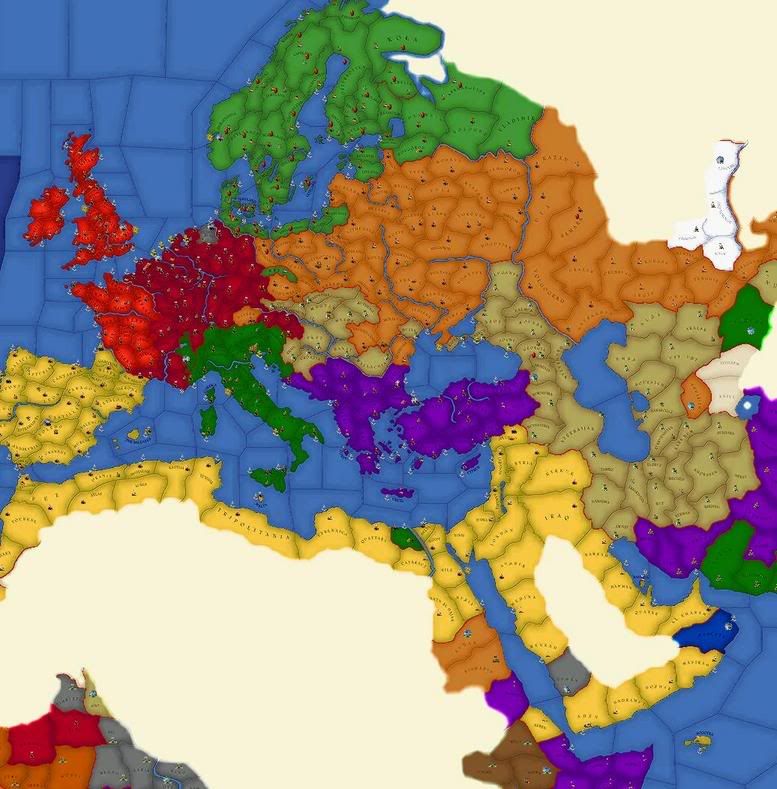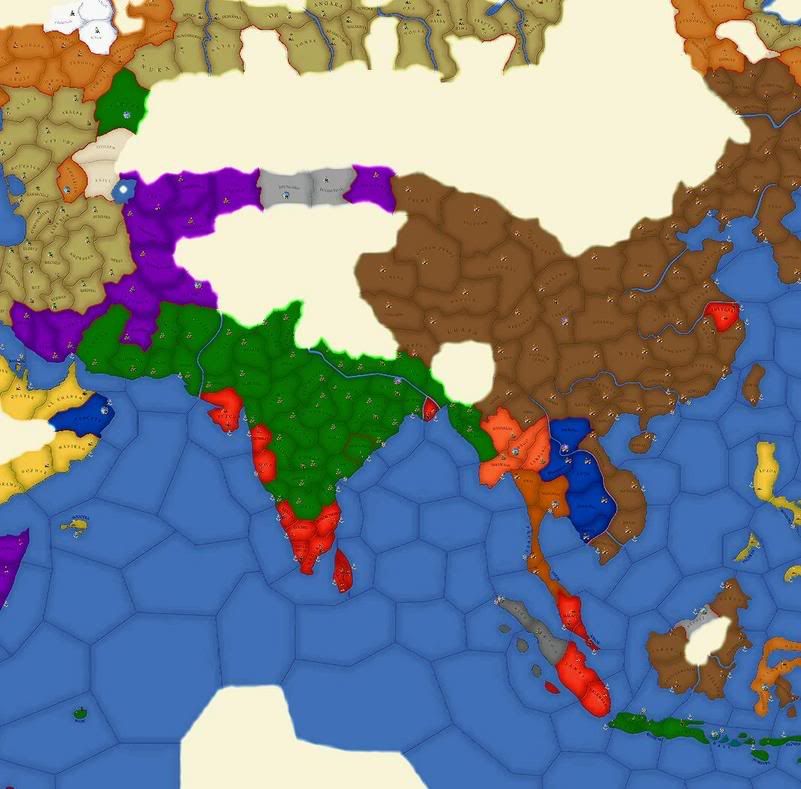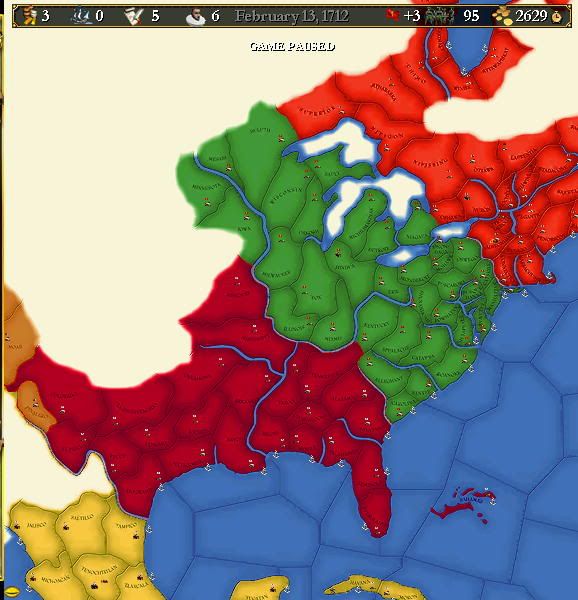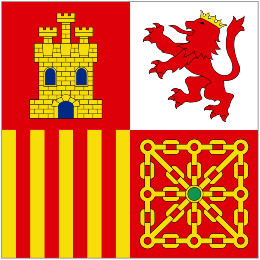(...) When the chance finally came, it was from an unexpected direction. The German border had been quiet since the Ynglings finally accepted the loss of Bremen and Oldenburg in the late 1430s; neither Burgundian nor Norwegian elites had felt there was anything to be gained by conquering more fractious German subjects, and thus the lands between the Weser and the Elbe had been tacitly accepted by both sides as a demilitarised zone.
However, as the 1700s progressed, a new spirit of pan-Germanism was making itself felt in the subject populations of Central Europe. And unlike the other powers with significant German populations, Burgundy was well placed to take advantage of this, since its dominant Dutch culture could plausibly be presented as a close sibling to German. Thus the Burgundian state increasingly claimed itself as protector of the entire German/Dutch people, "Das ewiges Deutsches Volk" in the phrase of the day. Naturally, this put the Burgundians increasingly at odds with Norway, Italy and Hungary, who each felt that a protector of their subject races was the last thing they needed.
Though the Burgundians held an advantage in manpower and gold over any one of these antagonists, the longstanding alliance between Norway and Hungary (soon joined by Italy) might have held them at bay. However, the threat of Spanish intervention, with their vast fleet, kept Norway out of the fray when the Burgundians did finally fall upon Hungary. Attacked on two fronts, the Hungarian dynasty was forced to cede its share of Germany to the Burgundians, as well as the remaining Arabic provinces to Spain.
The Ynglings were as capable of seeing the flow of the future as the next dynasty; having (admittedly under Spanish duress) permitted the Hungarians to be carved up, they were in no position to demand help when their own turn came. Thus, a Polish overture for a secret defensive treaty was welcomed with delight, and signed forthwith. Unfortunately, focused on their own concerns, the Ynglings had failed to inform their allies of the negotiations, and were caught completely flat-footed when Hungary, thirsting for revenge, attacked Poland in early 1707.
Caught between conflicting treaties, the Ynglings, uncharacteristically, dithered. One party felt that the ancient alliance with Hungary should be honoured - although Spain, throwing its weight around as usual, made it clear that Poland remained under the protection of his Most Catholic Majesty. Another party felt that Poland, being much more closely focused on European concerns and in any case not smarting from recent abandonment, would be a better friend in a Burgundian war. The conflict eventually gave Norway the worst of both worlds : The Ynglings entered the conflict on Poland's side, angering Hungary; but only a full year after it had started, annoying the Poles no end.
The Norwegian contribution to the war was small, almost
pro forma, accompanied by almost ceaseless diplomatic entreaties that both parties should cease their fighting and concentrate on the Burgundian threat. Six months after the Norwegian entry - just enough time for the deadly Yngling Hird to turn the initial stalemate into a Polish advantage - the Burgundians struck. Caught out of position, the Yngling army still fought with cold ferocity, aided by a rapid peace with Hungary. The initial battles, on well-fortified defensive terrain, went largely in Norwegian favour. But then the perennial lack of manpower began to make itself felt; the Germans, eyeing a hope of escaping their
stril status for the first time in centuries, rose in support of the invaders; and an unexpected naval defeat proved the final straw. Faced with the threat of Burgundian gold financing insurrection in the Baltic and Russian provinces, and on the promise that Ynglings in the conquered lands might keep a third of their estates, Norway surrendered and began to rebuild its shattered armies.
On the face of it, the new strategic situation was grim. The remaining mainland possessions were no more than a thin coastal crust, lacking defensive depth. And with their capital city now on the border of no less than three hostile empires, and their crumbling European holdings cut off from the wealthy, populous east, the Hungarians finally abandoned their increasingly thin Magyar heritage and proclaimed a new Persian Empire in Mesopotamia. With the retreat of the Hungarian capital and concerns from Europe, the Yngling elite could no longer rely on being able to subsidise overwhelming manpower in times of war.
In all this, however, there was one stripe of light : The Poles now, for the first time ever, shared a border with Burgundy; and they proved to be in no mood to let an old alliance stand between them and their state interests. When Burgundy attacked Italy, hoping to round out their German gains and proclaim a renewed Holy Roman Empire of the German People, Polish armies, flushed with victory from their vastly successful Hungarian campaign, crossed the Elbe. The Burgundian forces were grimly fighting their way down the Apennines, or being fed into the disease-ridden siege of Venice; Polish gains were rapid and enormous. The peace treaty returned Brandenburg to their rule for the first time in centuries, and at least temporarily banished the possibility of a united Dutch-German nation.
As one might expect, the internal effects of such a shattering defeat as the Norwegian Realm had suffered were vast. In the far-extended, massively inter-related Yngling elite, there was hardly anyone who had not suffered the loss of a relative. The unexpected loss of the sea war had caused bread shortages as grain imports from Poland were cut off; several cities saw actual food riots - unusual in Norway since the military obligation of all Yngling males meant that a riot would generally be put down very brutally. More seriously, the historic unity of the Ting, which had given rise to the saying "Yngling thinks like Yngling", was broken for the first time since the election of Erling to the throne in 1390. For a while Norway hovered on the brink of actual civil war as the factions fought it out, but in the end Yngling discipline held - admittedly after several duels had been fought, removing some of the worst hotheads from the political equation.
However, the mood of the new Ting was much less complacent than that of their predecessors; one might go so far as to call it panicky. From a determination to gain new allies and win the next war, it was a short step to hunting for scapegoats for the disaster; and in a society as dominated by fear of insurrection as Norway, it was very easy to decide that disloyal elements of the lower classes were at fault, and to take one's frustrations out on a helpless target.
The position of a
stril in Norway had never been that easy; but now the tightening regulations rolled out in a steady stream.
Strils were forbidden to move around the country. They were required to carry a passport at all times, and show it upon any Yngling's demand. Businesses were required to have at least 50% Yngling ownership; ships were required to have an Yngling captain; smallholdings were regulated and inspected to prevent them being used as meeting places for conspirators. Nor were the Ynglings themselves immune. The old custom of infanticide for sickly children had been dying out as even the poorest members of the elite became able to feed all their offspring; now it was mandated by law for defects as small as a harelip. The military training of Yngling children, already harsh, now became almost inhumanly rigorous; fatality rates of three or even five percent between the ages of five and fifteen became common, with protesters stigmatised as traitors to the race.
Stril-baiting had always been an occasional pastime for the poorer Ynglings, but in 1713 it was institutionalised as a yearly ritual (...)
- From Berserker to Battleship : Norway 1066-1920, Bergenhus University Press
------------------------------------------------------------
Late May, 1714
Møhlenpris, Bergen
Ra-ta-ta, ra-ta-ta, ra-ta-tatata... The monotonous rattle of the drums continued as it had all day, while the last group marched into the field. They were young men, though they already moved with the leonine grace that Ynglings most admired, every muscle sliding into place with no wasted effort. Most were blond; though none of them was able to show a beard, their shoulder-length hair, unbound and deliberately tangled, furthered the impression of a pride of lions - lions with the minds of men.
Their opponents waited stolidly. Where the young Ynglings tried to give off the graceful air of predators, each marching on his own, the
stril boys had closed ranks like a herd of grazers. There was nothing sheeplike about them, though; hirdsmen were not trained from the age of five, but nobody survived to the third year of candidature without a healthy dose of aggression. Instead, it seemed that an entire herd of bulls - young ones, perhaps, not yet scarred by mating fights, with everything to fight and live for - stood snuffling the wind, ready for battle.
The noise of the drums was everywhere. It echoed back from brick walls, quickened heartbeats, rattled brains. For the Yngling cadets in their red and white, it might have been heartening; it was the music of their lives, the beat that woke them from their beds, marched them out on drill and parade, soothed them to sleep at night. Their opponents had no such comfort. For a
stril, the everpresent rattle of the drums was the sound of Yngling dominion. Still, these boys were the best of their age groups, the ones who had been accepted into the training program for the
hird, the dream of every
stril - at least in Bergen. On the fringes of the Realm, the subject classes might dream of escape across the border, or of foreign conquest; but here, in the ancient heartland of the kingdom, there was no such hope. Submission, or the
hird, were the options; and to be a cadet for the
hird, they must be prepared to fight.
There was no ceremony; as soon as the Ynglings reached the middle of the field, the drums ceased, and the boys blurred into action. Ten Yngling boys, against fifteen
strils, two years older and heavier; it should have been a slaughter. So it was, but not of Ynglings. The
strils were stronger and heavier, but they had not had years of practice in striking the precise spots that kill or disable, nor the blurring speed that comes with sparring, every day from the age of five, with lead weights bound to hands and feet. The
strils charged as one, shoulder to shoulder, trying to plow the Ynglings under and get to close quarters where strength and weight would count. They were met with a flurry of hands and heels, striking with deadly precision for kneecaps, groins, ribs; where an Yngling's blow hit, a
stril went down, silent or groaning. Still, numbers made their weight felt too. In the tiny instant it took the cadets to recover, the
stril line plowed into them. There was a brief confusion of motion as the Ynglings tried to dance out of the way, to open the range and let skill have its way. When the dust settled, eight Ynglings were still standing, several bruised or limping, one bleeding from a cheek ripped open by strong teeth.
Seeing the battle over, the stretcher bearers ran to get the
hird recruits; it was necessary to teach them that Ynglings were far deadlier than they could ever hope to be, but there was no point in losing any fighting men. The Ynglings, on the other hand, were there to learn self-sufficiency; they could wait for the doctors. Indeed, the less injured were already tending the ones who couldn't get up. One had a broken leg where a booted
stril had landed on him with his full weight. The other was desperately trying to draw breath through a shattered windpipe, and failing. His friends' attempts at clearing the crushed bone from the airway failed; by the time the stretcher bearers arrived, the boy was unconscious, and not breathing.
A little later, the
strils, the twelve that had recovered from their beatings, stood again before their Yngling foes - one of them pale as he struggled not to put weight on his roughly splinted foot, all nine looking grim. An elder Yngling, a captain, spoke.
"You
strils have done us a service, and we thank you. You have killed a weakling, a boy who could not defend himself. Extra ration of rum tonight, a visit to the recreation house tomorrow. Dismissed."
The
strils raised a brief, harsh cheer before limping off the field. The captain turned to the Ynglings boys.
"As for you, you have failed. You did not protect one of your own. If you do not shield each other, who will? We are not a numerous people, and there is none who loves us. We must fight for each other, or perish. That is what it means to be an Yngling."
"Five lashes each. Dismissed."
-------------------------------------------------------------
The requested maps :
Europe. The loss of Germany is very partly compensated by buying two Baltic provinces from Poland. Note the vast Spanish presence in arabic lands - their main source of manpower and wealth, even beyond the New World. Poland has gained vastly; in addition to the harsh peace treaty, they got several provinces that defected when Ear left.
Asia. Splintered as it is, Persia is not looking so powerful anymore. The Chinese continue to grow; Europe is busy with its own affairs and has had no time to prune them back.
North America; the borders haven't moved too much. I don't show the south since they haven't changed an iota in that region - it's all a boring yellow.








